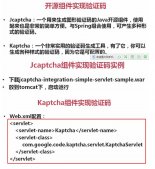数据校验在web应用里是非常重要的功能,尤其是在表单输入中。在这里采用Hibernate-Vapdator进行校验,该方法实现了JSR-303验证框架支持注解风格的验证。
一、导入jar包
若要实现数据校验功能,需要导入必要的jar包,主要包括以下几个:
classmate-1.3.1.jar
hibernate-vapdator-5.4.1.Final.jar
hibernate-vapdator-annotation-processor-5.4.1.Final.jar
hibernate-vapdator-cdi-5.4.1.Final.jar
jboss-logging-3.3.0.Final.jar
vapdation-api-1.1.0.Final.jar
二、常用的校验注解
| 注解 | 功能 |
|---|---|
| @Null | 验证对象是否为 null |
| @NotNull | 验证对象是否不为 null |
| @AssertTrue | 验证 Boolean 对象是否为 true |
| @AssertTrue | 验证 Boolean 对象是否为 false |
| @Max(value) | 验证 Number 和 String 对象是否小于等于指定值 |
| @Min(value) | 验证 Number 和 String 对象是否大于等于指定值 |
| @DecimalMax(value) | 验证注解的元素值小于等于 @DecimalMax 指定的 value 值 |
| @DecimalMin(value) | 验证注解的元素值大于等于 @DecimalMin 指定的 value 值 |
| @Digits(integer,fraction) | 验证字符串是否符合指定格式的数字,integer 指定整数精度,fraction 指定小数精度 |
| @Size(min,max) | 验证对象长度是否在给定的范围内 |
| @Past | 验证 Date 和 Calendar 对象是否在当前时间之前 |
| @Future | 验证 Date 和 Calendar 对象是否在当前时间之后 |
| @Pattern | 验证 String 对象是否符合正则表达式的规则 |
| @NotBlank | 检查字符串是不是 Null,被 Trim 的长度是否大于0,只对字符串,且会去掉前后空格 |
| @URL | 验证是否是合法的 url |
| 验证是否是合法的邮箱 | |
| @CreditCardNumber | 验证是否是合法的信用卡号 |
| @Length(min,max) | 验证字符串的长度必须在指定范围内 |
| @NotEmpty | 检查元素是否为 Null 或 Empty |
| @Range(min,max,message) | 验证属性值必须在合适的范围内 |
三、修改实体类
在类的属性上进行标注,如:
|
1
2
3
4
5
6
7
8
9
10
11
12
13
14
15
|
public class User { @NotBlank(message = "Username can not be empty") private String username; @NotBlank(message = "password can not be blank") @Length(min = 6, max = 16, message = "The length of the password must be between 6 and 16 bits") private String password; @Range(min = 18, max = 60, message = "Age must be between 18 and 60 years old") private Integer age; @Pattern(regexp = "^1[3|4|5|7|8][0-9]{9}$", message = "Please enter the correct format of the phone number") private String phone; @Email(message = "Please enter a valid email address") private String email; // other... } |
四、修改相应的处理方法
|
1
2
3
4
5
6
7
8
|
@RequestMapping(value = "/register")public String register(@Valid @ModelAttribute("user") User user, Errors errors,Model model) { if(errors.hasErrors()){ return "register"; } model.addAttribute("user", user); return "success";} |
五、视图输出
校验之后,我们通常需要在表单的输入框后进行文字反馈:
|
1
2
3
4
5
6
7
8
9
10
11
|
<form:form modelAttribute="user" method="post" action="register"> <fieldset> <legend>register</legend> <p> <label>name:</label> <form:input path="username" /> <form:errors path="username" cssStyle="color:red"/> </p> ... </fieldset></form:form> |
然而,有些时候并不推荐直接将错误信息写在注解的message属性里,这样不方便国际化。因此可以做以下几处修改:
1. 新建validatemessages.properties
|
1
2
3
4
5
6
|
username.not.blank = "username cannot be empty..."password.not.blank = "password cannot be empty"password.not.length = "password should be in 6-10"age.not.range = "age should be in 10-70"phone.not.pattern = "phone should be in format"email.not.format = "email should be in format" |
2. 实体类中的注解使用相对引用
|
1
2
3
4
5
6
7
8
9
10
11
12
13
14
15
16
17
18
19
20
|
public class User { @NotBlank(message = "{username.not.blank}") private String username; @NotBlank(message = "{password.not.blank}") @Length(min = 6, max = 10, message = "{password.not.length}") private String password; @Range(min = 10, max = 70, message = "{age.not.range}") private Integer age; @Pattern(regexp = "^1[3|4|5|7|8][0-9]{9}$", message = "{phone.not.pattern}") private String phone; @Email(message = "{email.not.format}") private String email; // other...} |
3. 修改配置文件
|
1
2
3
4
5
6
7
8
9
10
11
12
13
14
|
<!-- 默认的注解映射的支持 --> <mvc:annotation-driven validator="validator" conversion-service="conversion-service" /> <bean id="validator" class="org.springframework.validation.beanvalidation.LocalValidatorFactoryBean"> <property name="providerClass" value="org.hibernate.validator.HibernateValidator"/> <!--不设置则默认为classpath下的 ValidationMessages.properties --> <property name="validationMessageSource" ref="validatemessageSource"/> </bean> <bean id="conversion-service" class="org.springframework.format.support.FormattingConversionServiceFactoryBean" /> <bean id="validatemessageSource" class="org.springframework.context.support.ReloadableResourceBundleMessageSource"> <property name="basename" value="classpath:validatemessages"/> <property name="fileEncodings" value="utf-8"/> <property name="cacheSeconds" value="120"/> </bean> |
特别注意:value="classpath:validatemessages",文件名不加后缀!
至此,数据校验的整个过程就结束了。
最后还要特别强调的重点是:
视图中<form:form modelAttribute="contentModel" method="post">的modelAttribute="xxx"后面的名称xxx必须与对应的@Valid @ModelAttribute("xxx") 中的xxx名称一致,否则模型数据和错误信息都绑定不到。
<form:errors path="name"></form:errors>即会显示模型对应属性的错误信息,当path="*"时则显示模型全部属性的错误信息。
以上这篇SpringMVC 数据校验方法(必看篇)就是小编分享给大家的全部内容了,希望能给大家一个参考,也希望大家多多支持服务器之家。















